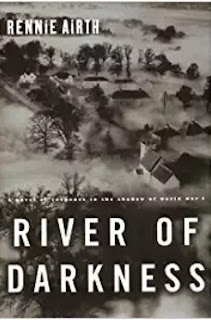Mystery readers know there's an important distinction between a mystery and a police procedural. The two genres often merge, usually bringing out the best of both, but however wonderful the center of that Venn diagram is the fact remains they are different things.
I began reading River of Darkness, the first John Madden mystery in the series, expecting a mystery and ending up enthralled in a just-one-more-page-on-my-thirty-minute-lunch-break police procedural that continually surprised me. Since police procedurals aren't generally my thing I've given a lot of thought as to why I loved this book so much.
First, it's an exceptionally well-done portrayal of England between the wars, when everyone -- survivors and those left to grieve alike -- are shrouded with ghosts of grief. Side tables have photos of long-dead, dull-eyed uniformed sons and brothers. Men struggle to make their way through life with missing limbs. The social chasm between those who could serve as soldiers and those who wished they could whispers beneath even the banalest social interactions.
And yet, there is a sense of newness and forward momentum, too. Cars are increasingly common. The emerging working class hankers for luxury buys like radios. Slowly but surely, people turn their eyes to the future by tilling the blood-stained soil, re-marrying or simply getting up and going to work.
So when a retired Colonel, his wife, and two staff members are brutally murdered in their Sussex manor, leaving their five-year-old daughter to be found cowering beneath the bed, the intrusion of violence on a village that's only recently found peace is especially jarring for the surrounding countryside.
Which is a solid premise for a good mystery but I'll admit the number of characters in the first thirty pages had me a bit worried. Most were inspectors of varying rank and jurisdiction and while that added a sense of realism to the setting I wasn't looking forward to lugging out a notebook to keep track of characters. Fortunately, Airth handles the multitude well, generally only dealing with a handful of characters at a time and working titles or formal salutations that serve as gentle reminders for the reader into the text.
Airth also takes the interesting tack of telling som of the story from the point of view of a minor, auxiliary character. The struggle of this junior officer, just out his police blues, to impress his superiors and overcome his inexperience is both compelling and, from a technical writing standpoint, a fun twist. Although I'm sure it's been done before, I hadn't come across this technique and enjoyed the change of pace from the usual protagonist only/objective third-person perspective usually used by authors.
The protagonist, John Madden, has been scarred by so much tragedy (even before surviving World War I) it almost crosses from pathos to eye-roll inducing. But here, too, Airth manages to pull back just in time. We are given a man who is as broken as Charles Todd's Ian Rutledge but has kept the kindness and compassion of Barbara Cleverly's Joe Sandilands.
And, unlike the latter two series, this series travels the path of redemption, hope, and healing. To say more would be to break my cardinal rule of no spoilers or plot re-writes, but it was interesting to see a character in this genre turn towards the light. It gave the story a nice bit of texture.
So we have a solid, intriguing murder with an unconventional modus operandi and a good protagonist. So far so good, but plenty of the mysteries I review have those. What pushed this book from merely a good read to a great one?
Here I'm forced to break my second rule of the blog and eschew objectivity and admit a personal bias. One of the main reasons I read historical fiction mysteries, particularly those that take place in early 20th century England, is because the mysteries must be solved using new criminology and forensics but no modern technology.
Which is why, as a police procedural, this book excels. Madden and his partner are hunting a serial killer before having the vocabulary to articulate what a serial killer is. They know they're hunting a madman, but convincing anyone else it's a particular type of madman presents a formidable challenge.
Superiors in Scottland Yard categorically refuse to entertain the notion of employing what we would call forensic psychology. Fingerprints are new (but used) and even the use of the car is a luxury and not guaranteed. Inspectors have to investigate multiple locations and communicate when the nearest phone is often literally miles away. Overcoming the bureaucracy of the War Office in an attempt to get records is hindered simply by where those records may be physically stored. Airth covers all of these challenges without over-explaining or overdoing it.
Another reason I enjoyed this book is that, like many mystery readers, I have a true crime penchant, specifically for serial killers. The way the First World War plays into this killer's modus operandi is fascinating, horrifyingly plausible and utterly gripping.
Again, I thought I was reading a mystery but found myself happily immersed in a well-plotted psychological thriller with suspense on par with that master of horror and psychological suspense, Alex Grecian.
Finally, although there is a resolution, much like in real life there aren't really any "winners" and even the final key to resolution is more luck than skill. But for all that, as I said, I simply couldn't stop turning the page.

No comments:
Post a Comment